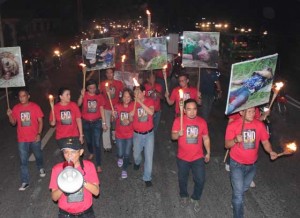Five years after 58 people were killed in the Philippines’ worst political massacre, anger among victims’ relatives is building, with no one yet convicted and the alleged masterminds still enjoying power.
Nine leaders of the Ampatuan clan accused of orchestrating the slaughter are among dozens on trial, but there are deep concerns the proceedings could take many more years and that witnesses are being killed or intimidated.
“Sometimes we feel hopeless, that this is all going nowhere,” Noemi Parcon, whose husband was among 32 journalists killed in the massacre, told Agence France Presse as she attended the trial in Manila this week. “We’d be happy even if only the principals are convicted.”
The leaders of the Ampatuan family, who ruled the impoverished province of Maguindanao, are accused of organizing the killings on November 23, 2009, in a bid to quash an election challenge from a rival clan.
Thirty-two media workers were among those killed, making the attack one of the deadliest ever recorded globally against journalists.
Andal Ampatuan Sr. had ruled Maguindanao as governor for about a decade under the patronage of then-president Gloria Arroyo, who had funded a private army for the clan as a buffer against Muslim separatist rebels.
Ampatuan’s son and namesake is accused of leading the militia in stopping a convoy that was carrying his political foe’s wife, relatives, lawyers and the journalists, then gunning them down on a grassy hill.
The victims’ bodies were found almost immediately afterwards in roadside pits that were dug using a government-owned excavator.
Dangerously slow
Father and son, plus seven other Ampatuans, are among 111 people detained while on trial. They deny carrying out the murders.
However, the government said 79 suspects, including nine Ampatuans, remain at large.
In the Philippines, even a simple trial involving one accused person typically takes many years to complete.
Amid fears the Maguindanao massacre trial could take decades, the Supreme Court last year took steps to speed up proceedings, including the scheduling of twice-weekly hearings instead of once a week.
President Benigno Aquino 3rd has also said he wants verdicts against the Ampatuan leaders announced by the time he stands down in mid-2016.
Harry Roque, a private prosecutor representing the families of 13 victims, told Agence France-Presse he expected verdicts against the main defendants next year.
But the chief prosecutor Archie Manabat said he could not give any timeframe.
“We want to finish this as soon as possible, but there are many constraints,” Manabat told Agence France-Presse this week on the sidelines of the trial.
The court is currently focused on petitions for bail by the Ampatuan leaders and Human Rights Watch said in a statement to mark the five-year anniversary that the case was in “effective judicial limbo”.
“Bail petitions and testimony challenges by the defence lawyers . . . have overwhelmed the court,” Human Rights Watch’s deputy director for Asia Phelim Kine said in the statement.
Witnesses killed or intimidated
Meanwhile, human rights groups and victims’ relatives say witnesses are being killed or intimidated in a bid to sabotage the case.
Four people who had already given testimony or were scheduled to, as well as three relatives of potential witnesses, have been murdered over the past few years.
A Maguindanao man who police said had agreed to testify at the trial was on Tuesday the latest to be killed. A second would-be witness was wounded in the attack, a roadside ambush by a group of gunmen.
“The attack clearly aims to cow the other witnesses into submission,” the Philippines’ National Press Club said in a statement.
Adding to the fears, the Ampatuan family continues to wield huge influence over Maguindanao, despite the clan’s leaders being detained in Manila.
The wives of three detained Ampatuan defendants were elected as town mayors in Maguindanao last year. Sixteen other Ampatuans were elected to local government posts.
Local rights groups and election monitors said at the time the Ampatuans’ election wins were not a surprise, citing the well-known clan power structure in Maguindanao and other Muslim-dominated southern provinces.
But Erlyn Umpad, whose television cameraman partner was among those murdered, said she and many other relatives of victims would never give up their quest for justice.
“I want them put away for life. They need to suffer too, just like me,” the 25-year-old told Agence France-Presse at the trial this week, sitting in black mourning clothes a few metres (yards) from about 30 of the alleged killers.
AFP


